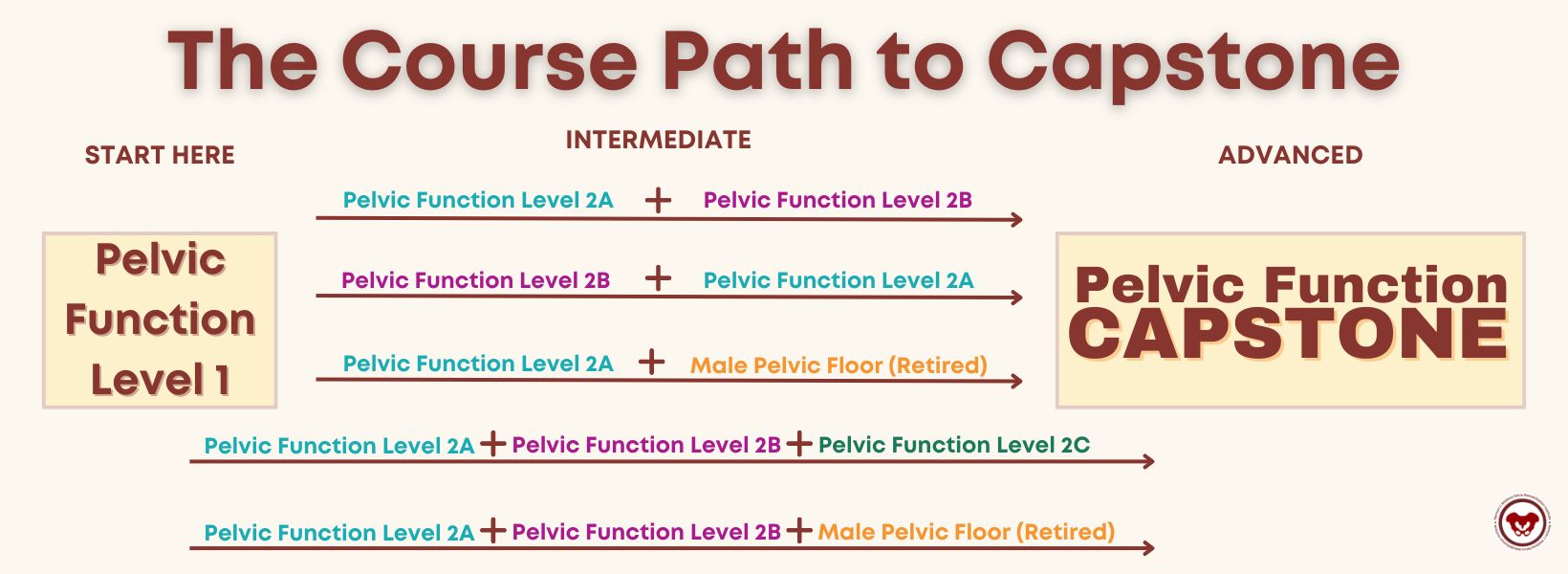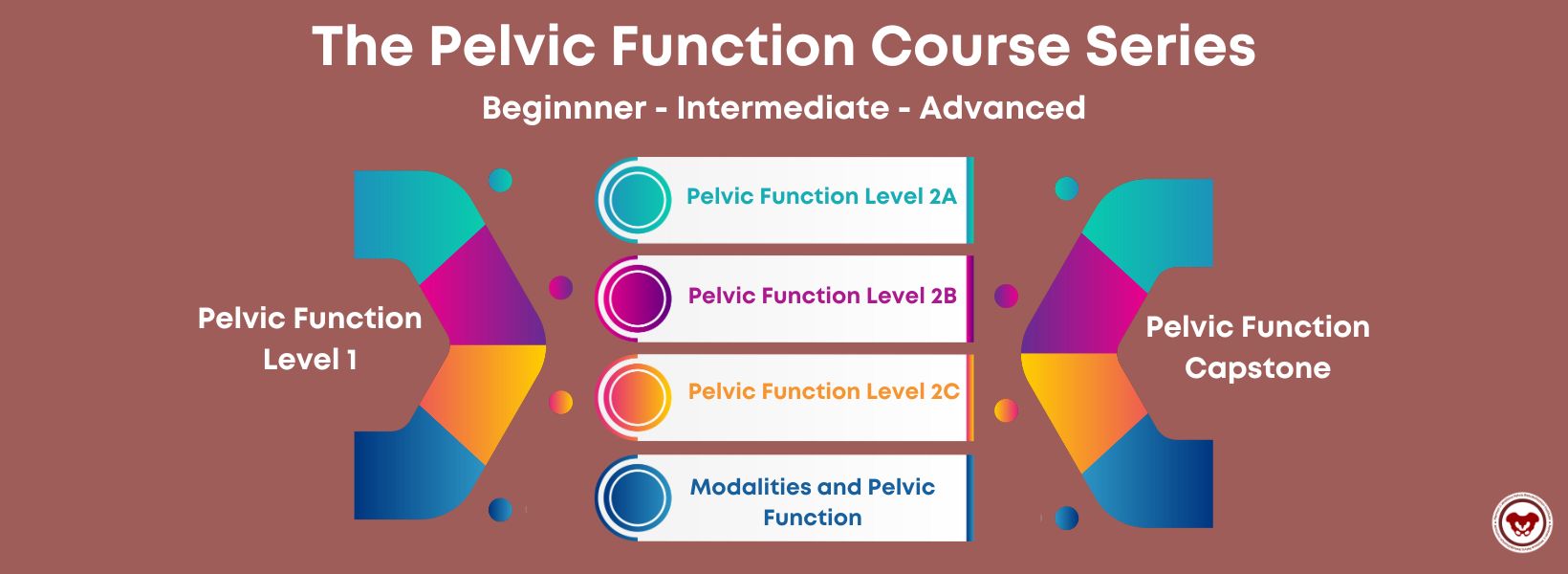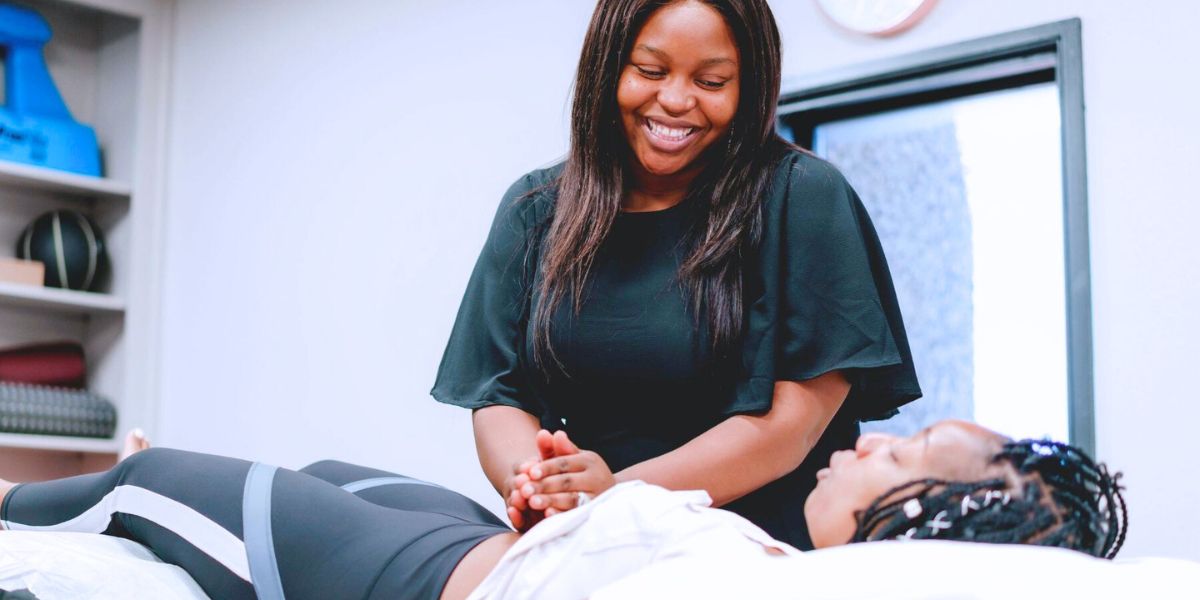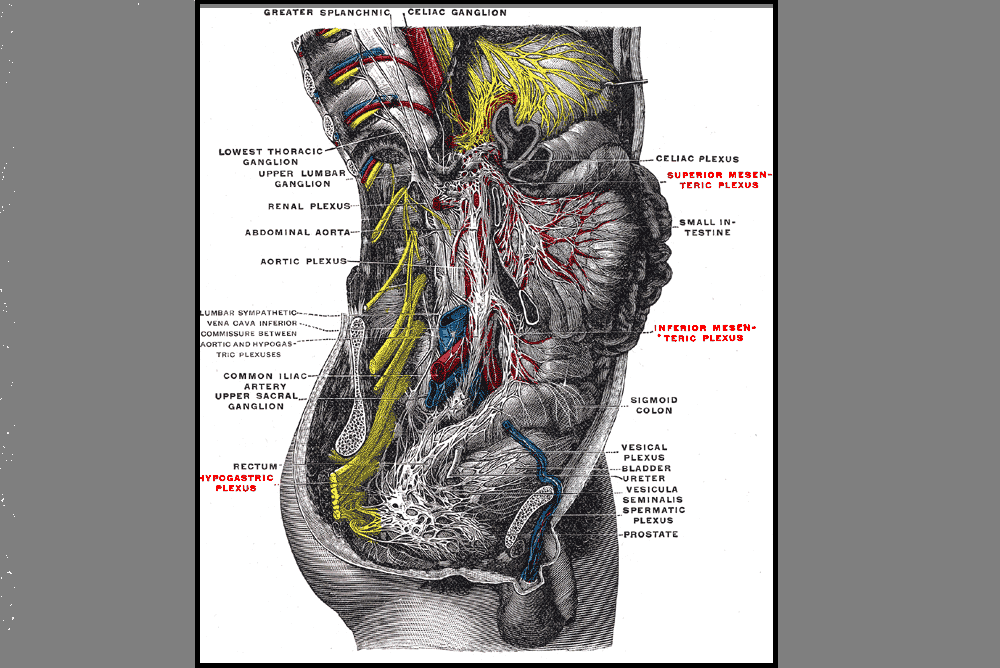![]()
Most practitioners know that Capstone is the advanced level course that caps off the Pelvic Function Series. This article covers two main questions:
- Why should you aspire to Capstone?
- What is the course path to Capstone?
- Where do you go after Capstone?
Why should you aspire to Capstone?
If you are new to pelvic rehabilitation or an experienced practitioner, you should think about taking Pelvic Function Capstone. For beginner practitioners who are interested in completing the Pelvic Function Series, the Capstone path will take you from the introductory Pelvic Function Level 1, where you learn intra-vaginal exam techniques, through Pelvic Function Level 2A, which includes an introduction to anorectal examination. AND you can tailor your course journey to your patient demographics.
For our advanced practitioners, Capstone is an excellent way to round out your course journey and really focus on those more advanced topics that you see in pelvic rehabilitation such as endometriosis, infertility, polycystic ovarian syndrome (PCOS), surgery complications, gynecological cancers, neuroanatomy, and the role of pharmacology and nutrition in pelvic health/pelvic pain.
What is the course path to Capstone?
 '
'The Pelvic Function Series includes six courses, but you do not need to take all the courses in order to register for Pelvic Function Capstone. The Pelvic Function Courses include:
- Pelvic Function Level 1: Introduction to Pelvic Health. Intra-vaginal exam will be introduced in labs.
- Pelvic Function Modalities: The Pelvic Health Toolkit. This is an in-person lab course featuring a variety of modalities.
- Pelvic Function Level 2A: Colorectal Pelvic Health and Pudendal Neuralgia, Coccyx Pain. Anorectal internal exam will be introduced in labs.
- Pelvic Function Level 2B: Urogynecologic Topics in Pelvic Health.
- Pelvic Function Level 2C: the Male Pelvic Floor and Men’s Pelvic Health.
- Pelvic Function Series Capstone: Integration of Advanced Concepts in Pelvic Health.
While you do need to take Pelvic Function Level 1 first - you should choose your next course based on your patient demographics. A lot of practitioners see patients with fecal incontinence or coccyx pain, and so after PF1, they may choose to prioritize PF2A as the next step in their journey. Others may see patients with penile pain or incontinence post-prostatectomy and may choose to take 2C as their next step.
The course path options:
- · If you have taken PF1 and 2B, you must take 2A prior to Capstone.
- · If I have taken PF1, 2A, and 2B - you may advance to Capstone.
- · If you have taken PF1, 2A, and the Male Pelvic Floor course, you may advance to Capstone
- · If you have taken PF1, 2A, 2B, and the Male Pelvic Floor course, you may advance to Capstone
Where do you go after Capstone?
If you are in the elite few that have taken Capstone, then congratulations! You may be asking yourself “Where do I go now?” There are a few options depending on your interests.
Here are some recommended courses:
- · Ramona Horton’s Visceral Mobilization Series – if you are looking for a fascial course for hands-on skills
- · Nerves and the Nervous System Courses – Pudendal Neuralgia, Sacral Nerve, and Lumbar Nerve
- · Oncology of the Pelvic Floor Series
- · Parkinson Disease
- · Pain Science for the Chronic Pelvic Pain Population
- · Pharmacologic Considerations for the Pelvic Health Provider
- · Nutrition Perspectives for the Pelvic Rehab Therapist
If you are thinking of further certification then it may be time to look into the Pelvic Rehabilitation Practitioner Certification process. While there is no required coursework one must complete to sit for the PRPC exam, having several courses from beginner to advanced levels under your belt is certainly helpful.
Ready, Set, Go!
There’s nothing left to do but do it! Sign up for a Capstone course with HW.
The weekend of October 19-20 is the next scheduled Capstone Course that has several satellites and a self-hosted option for attendance:
- Bethpage NY
- Boston MA
- Houston TX
- New York NY
- Raleigh NC
- Salt Lake City UT
- Sellersville PA
- Self-Hosted
We look forward to seeing you in a course soon!

Congratulations on completing Pelvic Function Level 1 (PF1) and entering the world of pelvic rehabilitation. Are you ready for your next course but not quite sure which one to take? Well, you’re not alone. Everyone’s pelvic health educational journey is different based on their interests and patient demographics and there are a lot of course options available.
I’m going to zero in on the intermediate-level courses in the Pelvic Function Series for you as HW does recommend that practitioners take at least one or two of these. If you’ve looked at the course page you’ve noticed that there are three courses with a Level 2 designation – as well as a lab course. What does this mean? These courses are designed to be a progression of knowledge and skills learned in the foundational course Pelvic Function Level 1.
Here are the intermediate courses:
- Pelvic Function Level 2A (PF2A) - Colorectal Pelvic Health, Pudendal Neuralgia, and Coccyx Pain
- Labs provide an introduction to internal anorectal examination for all genders.
- Pelvic Function Level 2B (PF2B) Urogynecologic Examination and Treatment Interventions
- Labs provide external abdominal and pelvic and internal vaginal approaches.
- Pelvic Function Level 2C (PF2C) Men’s Pelvic Health and Rehabilitation
- Labs provide external abdominal, gluteal, perineal, and internal anorectal approaches.
- Modalities and Pelvic Function (PFMOD) The Pelvic Health Toolkit
- Labs provide supervised instruction to practice modalities.
Ready for a more in-depth look at the courses? Here is a more detailed breakdown:
Pelvic Function Level 2A (PF2A) Colorectal Pelvic Health, Pudendal Neuralgia, and Coccyx Pain
This course is intended for the pelvic health clinician who treats patients with common functional gastrointestinal (GI) dysfunctions and is interested in learning internal anorectal examination and the use of balloon re-training.
In this course, you will learn about common functional gastrointestinal (GI) dysfunctions including irritable bowel syndrome, fecal incontinence, and constipation. Course topics provide an introduction to nutrition for bowel health, colorectal conditions, and oncology. Participants will be educated on how diagnoses such as hemorrhoids, fistulas, fissures, and anorectal pain including pudendal neuralgia and coccygodynia may be improved with pelvic rehabilitation.
Practical, trauma-aware, hands-on labs provide supervised instruction of pelvic function evaluation with external observation, palpation, and internal anorectal examination of pelvic skeletal and soft tissues. These labs include an external perineal and internal anorectal approach as well as education in the use of balloon re-training.
Pelvic Function Level 2B (PF2B) Urogynecologic Examination and Treatment Interventions
This course is intended for the pelvic health clinician who treats patients with conditions including urinary incontinence, chronic pelvic pain (CPP), and pelvic organ prolapse.
In this course, you will learn, with increased specificity, evaluation for urogynecologic conditions as well as an overview of medical management, and multi-disciplinary pelvic healthcare. Course topics provide a more in-depth understanding of urinary incontinence, chronic pelvic pain (CPP), and pelvic organ prolapse. Participants will be educated on how diagnoses such as interstitial cystitis/painful bladder syndrome (IC/PBS), urinary tract infections, vaginismus, vulvar pain, dyspareunia, polycystic ovarian syndrome (PCOS), and endometriosis may be improved with pelvic rehabilitation.
Practical, trauma-aware, hands-on labs provide supervised instruction of pelvic structures in relationship to the vaginal canal and surrounding structures such as the lumbopelvic nerves, the uterus, urethra, bladder, and rectum. Interventions instructed will include patient management of trunk and pelvic pressure, relaxation training, breathing, and manual therapies for a variety of pelvic dysfunctions. These labs include an external abdominal and pelvic and internal vaginal approach.
Pelvic Function Level 2C (PF2C) Men’s Pelvic Health and Rehabilitation
This course is intended for pelvic health clinicians who are interested in treating male pelvic health conditions.
In this course, you will learn critical detailed information about men’s pelvic health conditions including post-prostatectomy urinary incontinence, erectile dysfunction, and chronic pelvic pain (CPP). Participants will be educated on how diagnoses such as hard/flaccid, urgency/frequency, scrotal, testicular, and penile pain may be improved with pelvic rehabilitation.
Practical, trauma-aware, hands-on labs provide supervised instruction of pelvic health evaluation with external observation, palpation, and internal anorectal examination of pelvic structures and soft tissues. These labs include an external abdominal, gluteal, perineal, and internal anorectal approach.
Modalities and Pelvic Function (PFMOD) The Pelvic Health Toolkit
This course is for the pelvic health clinician who has the opportunity to use modalities as an adjunct to their patient's care and goes beyond the "Big 3" (E-Stim, Biofeedback, and Ultrasound).
In this course, you will learn about and practice a variety of modalities. Modalities in PFMOD include biofeedback, cold laser/light therapy, electrotherapy, real-time ultrasound imaging, belts, braces, supports, lubricants, myofascial tools/techniques, and “special topics” that can be used to assist in relaxation, bowel and bladder health, and sexual function. Specialized knowledge from experts in different subjects will be shared throughout the course.
Certain modalities that are impractical to practice live will be shared and demonstrated via video. These Interventions include shockwave, rehabilitative ultrasound imaging, dry needling, and light therapy.
Practical, trauma-aware, hands-on labs provide supervised instruction to practice utilizing biofeedback and other modalities to allow kinesthetic learning before prescribing and recommending them to patients.
Previous course sponsors who have provided samples and products have included:
- Nix
- Flyte
- OhNut
- Replens
- RockTape
- Bellies Inc.
- Ice Soothers
- BabyBellyBand
- Intimate Rose
- The Pro Group
- Good Clean Love
- Cushion Your Assets
If you are interested in taking an intermediate-level Pelvic Function Course but still have questions, then please contact us.









































